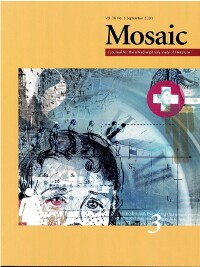Issue 36.3
Overview

General Issue
Published: September 2003
View the issue introduction or see the issue summary and contents below.
10 essays, totalling 192 pages
$15.00 CAD
Essays in this general issue of Mosaic revolve around one or more of four central themes: reading, re-reading, reconsidering identity, and reconsidering history. Look for essays examining the relation between art and being, postmodern reconsiderations of Joseph Stalin, and fictional portrayals of female characters in revolutionary Spain. Other essays examine a range of texts, including Hualing Nieh’s Mulberry and Peach, the poetry of Tom Paulin, Charles Bruce’s The Channel Shore, and Edith Wharton’s The Age of Innocence.
The Matter of Culture: Aesthetic Experience and Corporeal Beingrenée c. hoogland This essay considers the critical role of art in the actualization of embodied subjectivity. Drawing on the work of Paul Ricoeur, Félix Guattari, and Mikhail Bakhtin, the author argues that an active engagement with art is intrinsic to both the generation of meaning and the process of subjective becoming. | |
Trauma and Multiplicity in Nieh’s Mulberry and PeachMonica Chiu This essay addresses immigration, trauma, and psychosomatic pathology in Hualing Nieh’s Mulberry and Peach. It resists a postmodern reading that would categorize Mulberry as a successful, bifurcated border crosser in an age of transnationality, and it draws a clear comparison and difference between Nieh’s novel and Bharati Mukherjee’s Jasmine. | |
Appropriations of History, Gothicism, and Cthulhu: Fred Chappell’s DagonCasey Clabough This essay considers Dagon’s preliminary sources, the relationship between its gender-conscious construction of character and its gothic qualities, its innovative appropriation of a fictional historical source, its unique portrayal of American materialism, and its distinctive rendering of gothic and fantastic genre paradigms. | |
Schnitzler, Kubrick, and “Fidelio”Raleigh Whitinger and Susan Ingram Stanley Kubrick’s Eyes Wide Shut gives a constructive, pro-feminist thrust to Arthur Schnitzler’s Traumnovelle, heightening its critical dialogue with the myths and conventions of male mastery as well as capturing and enhancing, with its audio and visual capacities, the original’s self-conscious critical dialogue with its own artistic tradition. | |
“Frye Spiel”: Northrop Frye and Homo LudensGraham Nicol Forst Capitalizing on the appearance of the first ten volumes of the Collected Works of Northrop Frye, this essay shows how Frye took Johan Huizinga’s sociological notion of homo ludens—man the player—and developed its implications for the humanities. | |
The Devil You Know: Postmodern Reconsiderations of StalinKaren Ryan Casting Stalin as the devil or Antichrist has been a productive technique in Russian literary satire. Postmodern treatments of Stalin by Viktor Erofeev, the Sots artists Komar and Melamid, and the film director Semen Aranovich have begun to reconsider the myth of Stalin’s demonism and to confront the dictator’s humanity. | |
Defying the Past in Post-Franco Spain: The Interrogation of Aurora RodríguezMaria Van Liew When imaginary sources of social transformation interact with the historical determinants of democratic transitional Spain, new symbolic possibilities arise from which gender issues come to be addressed anew. This essay investigates the historical and fictional fusion of two female subjects, mother and daughter, whose visions of social and personal revolution collide in a famous case of feminist filicide. | |
“A Free Strenuous Spirit”: Liberty, Agency, and Community in the Poetry of Tom PaulinSarah Broom This essay considers the treatment of ideas of the individual and the community in Tom Paulin’s poetry, giving particular emphasis to the issues of agency and freedom | |
“No Place For a Girl”: Place and Gender-Identity in The Channel ShoreLisa Chalykoff Using contemporary place theory, this essay traces the rules that best explain the movement of male and female characters in Charles Bruce’s The Channel Shore. By highlighting the difference in these rules, and the logic of their application, it counters the popular view that this novel depicts an idealized community. | |
A Dialectic of Deception: Edith Wharton’s The Age of InnocenceJean Witherow Žižek’s interpretation of Lacan’s work as ideology critique enhances my reading of The Age of Innocence. While the objet petit a becomes the forbidden, motivating impetus, the failure of language maintains the performative effect of society as “the Thing.” |